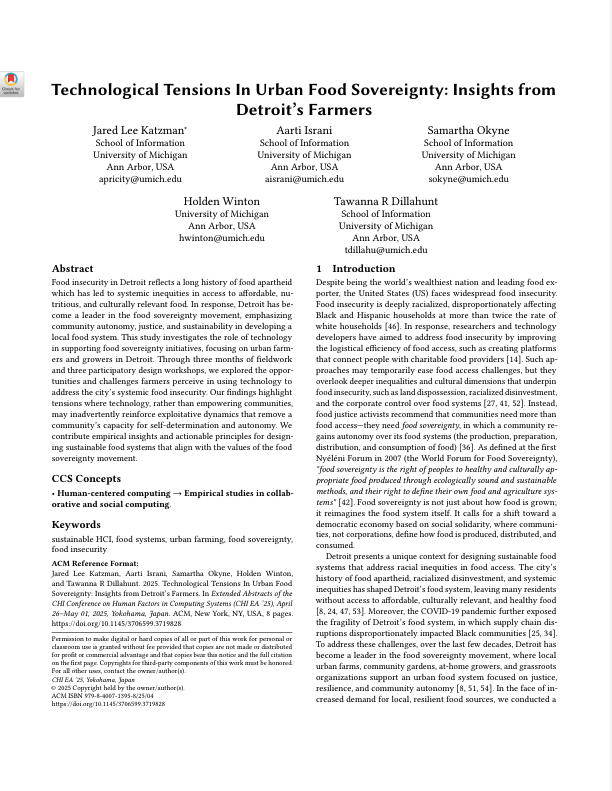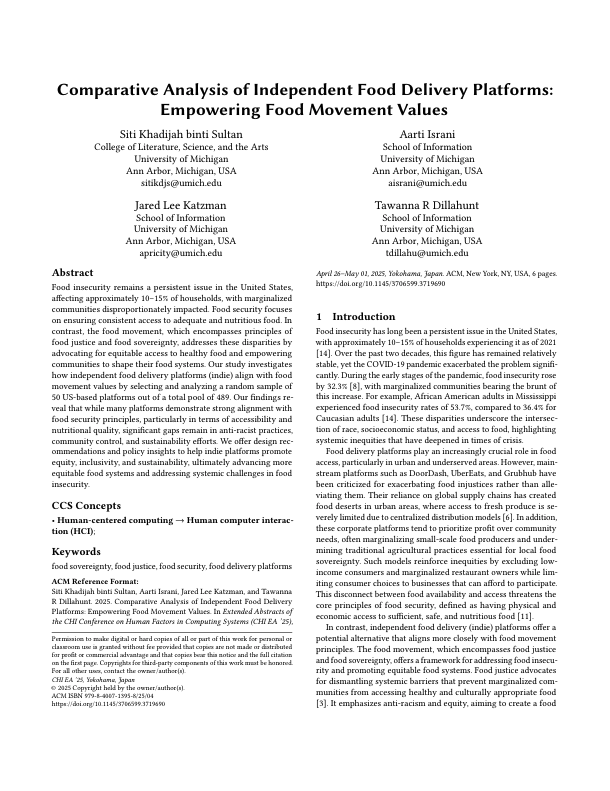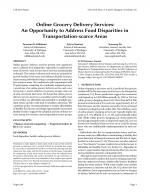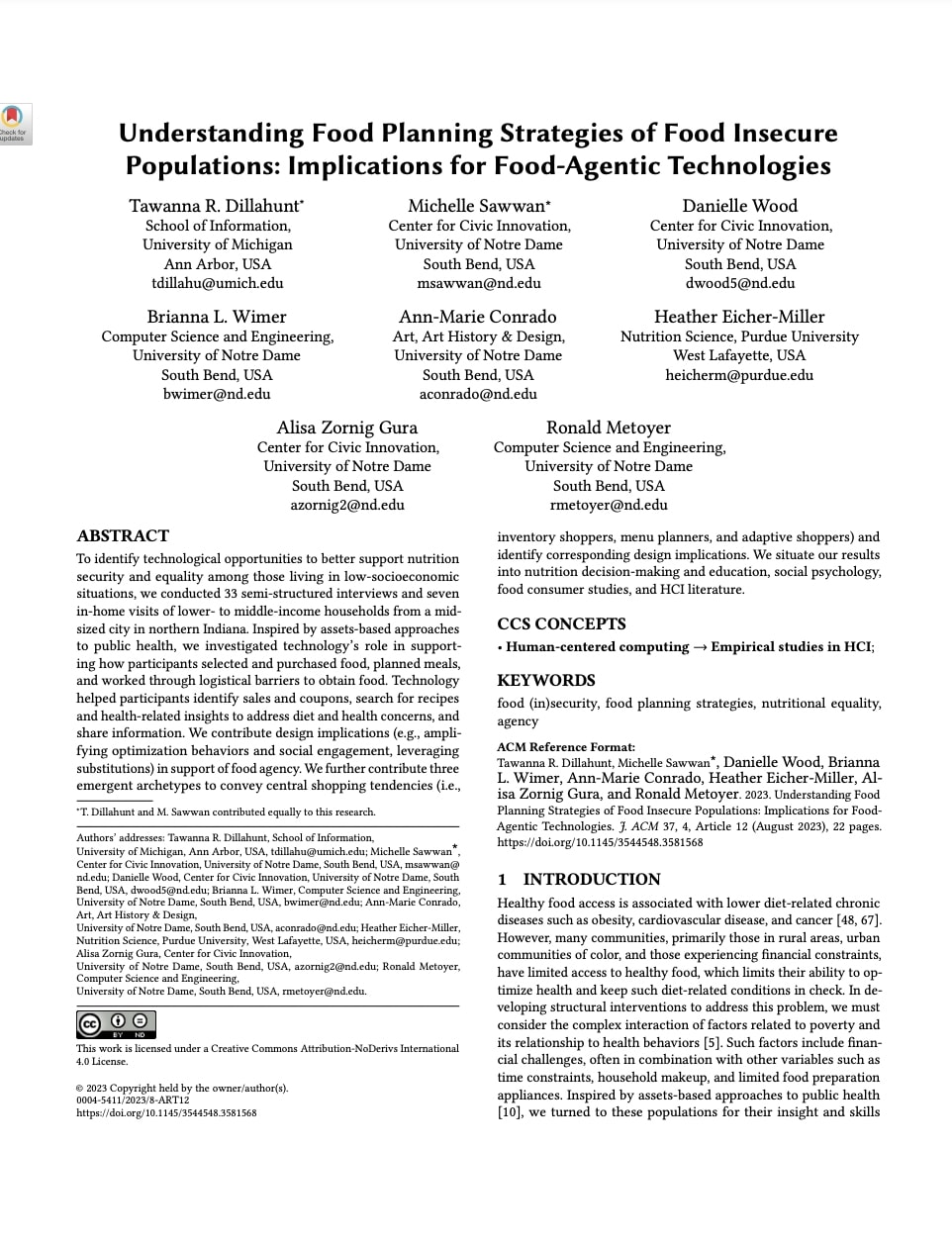
Zero Hunger
Inform efforts to collectively end hunger, achieve food security and improved nutrition, and promote sustainable agriculture
Related work
-
Technological Tensions In Urban Food Sovereignty: Insights from Detroit’s Urban Farmers.
Katzman, J., Israni, A., Okyne, S., Winton, H., Dillahunt, T.R.
| In ACM CHI'25 Extended Abstract | Food insecurity in Detroit reflects a long history of food apartheid which has led to systemic inequities in access to affordable, nutritious, and culturally relevant food. In response, Detroit has become a leader in the food sovereignty movement, emphasizing community autonomy, justice, and sustainability in developing a local food system. This study investigates the role of technology in supporting food sovereignty initiatives, focusing on urban farmers and growers in Detroit. Through three months of fieldwork and three participatory design workshops, we explored the opportunities and challenges farmers perceive in using technology to address the city’s systemic food insecurity. Our findings highlight tensions where technology, rather than empowering communities, may inadvertently reinforce exploitative dynamics that remove a community’s capacity for self-determination and autonomy. We contribute empirical insights and actionable principles for designing sustainable food systems that align with the values of the food sovereignty movement. -
Comparative Analysis of Independent Food Delivery Platforms: Empowering Food Movement Values.
Sultan, S.K.b.. Israni, A., Katzman, J.L., Dillahunt, T.R.
| In ACM CHI'25 Extended Abstract | Food insecurity remains a persistent issue in the United States, affecting approximately 10–15% of households, with marginalized communities disproportionately impacted. Food security focuses on ensuring consistent access to adequate and nutritious food. In contrast, the food movement, which encompasses principles of food justice and food sovereignty, addresses these disparities by advocating for equitable access to healthy food and empowering communities to shape their food systems. Our study investigates how independent food delivery platforms (indie) align with food movement values by selecting and analyzing a random sample of 50 US-based platforms out of a total pool of 489. Our findings reveal that while many platforms demonstrate strong alignment with food security principles, particularly in terms of accessibility and nutritional quality, significant gaps remain in anti-racist practices, community control, and sustainability efforts. We offer design recommendations and policy insights to help indie platforms promote equity, inclusivity, and sustainability, ultimately advancing more equitable food systems and addressing systemic challenges in food insecurity. -
Online Grocery Delivery Services: An Opportunity to Address Food Disparities in Transportation-scarce Areas
*Best Paper* | Dillahunt, T. R., Simioni, S., and Xu, X. (2019)
| In Proc. of the CHI'19 Conference on Human Factors in Computing Systems | Online grocery delivery services present new opportunities to address food disparities, especially in underserved areas. However, such services have not been systematically evaluated. This study evaluates such services’ potential to provide healthy-food access and infuence healthy-food purchases among individuals living in transportation-scarce and low-resource areas. We conducted a pilot experiment with 20 participants consisting of a randomly assigned group’s 1-month use of an online grocery delivery service, and a control group’s 1-month collection of grocery receipts, and a set of semi-structured interviews. We found that online grocery delivery services (a) serve as a feasible model to healthy-food access if they are afordable and amenable to multiple payment forms and (b) could lead to healthier selections. We contribute policy recommendations to bolster afordability of healthy-food access and design opportunities to promote healthy foods to support the adoption and use of these services among low-resource and transportation-scarce groups. Health insurance shoppers attempting to find the best health insurance plan for their needs may benefit from reviews of plans left by other consumers; however, these reviews must be fairly detailed in order to be valuable. We posit that an appeal to empathy may motivate consumers to leave more detailed, and thus more valuable, reviews about health insurance plans for future insurance purchasers. -
Understanding Food Planning Strategies of Food Insecure Populations: Implications for Food-Agentic Technologies
Dillahunt, T.R., Sawwan, M., Wood, D., Wimer, B.L., Conrado, A.M., Miller, H.E., Gura, A.Z., and Metoyer, R. (2023)
Understanding Food Planning Strategies of Food Insecure Populations: Implications for Food-Agentic Technologies Dillahunt, T.R., Sawwan, M., Wood, D., Wimer, B.L., Conrado, A.M., Miller, H.E., Gura, A.Z., and Metoyer, R. (2023) | In Proc. of the CHI'23 Conference on Human Factors in Computing Systems | To identify technological opportunities to better support nutrition security and equality among those living in low-socioeconomic situations, we conducted 33 semi-structured interviews and seven in-home visits of lower- to middle-income households from a midsized city in northern Indiana. Inspired by assets-based approaches to public health, we investigated technology’s role in supporting how participants selected and purchased food, planned meals, and worked through logistical barriers to obtain food. Technology helped and health-related insights to address diet and health concerns, and share information. We contribute design implications (e.g., amplifying optimization behaviors and social engagement, leveraging substitutions) in support of food agency. We further contribute three emergent archetypes to convey central shopping tendencies (i.e.,inventory shoppers, menu planners, and adaptive shoppers) and identify corresponding design implications. We situate our results into nutrition decision-making and education, social psychology, food consumer studies, and HCI literature.



